- Home
- Tessa Gratton
The Strange Maid Page 2
The Strange Maid Read online
Page 2
In a week and a half I’ll be seventeen. It’s a decade since I climbed the New World Tree, since Odin Alfather, god of the hanged, named me the next Valkyrie of the Tree, and still I have not won my place on the Valkyrie council.
For 250 years, the Council of Valkyrie has advised the president and Congress on matters of the gods. There were nine of them until the Thralls’ War, when Kara Neverborn defied Odin and was punished by being stripped out of the world, her name forgotten by all but the Valkyrie. Ever since then, the remaining eight have behaved—to a fault. They serve mead to the gods every holiday in Bright Home. They raise funds and awareness for charity. They speak out on behalf of the gods and sometimes mediate between our human government and Asgard. They officiate funerals and holy sacrifices. They’re celebrities who wield tremendous influence, can go anywhere and do anything because they touch the gods and walk among them.
And I belong with them.
Memory and longing draw me toward the lakefront park, toward the manicured lawns and bright maple trees, the museums and observatories and avenue of temples at the water’s edge. I played here every other year of my apprenticeship, when it was the Valkyrie of the Lake, Myra Quick’s turn to keep and teach me. I laughed all the time; I had clean sheets and anything I wished to eat. Shoes for running and shoes for walking, shoes for dancing. Silver rings and jeweled pins to hold my braids off my neck. Caramel ice cream.
I had sisters.
After Odin named me, he turned me over to the eight women who make up the Valkyrie council, quelling their irritation that he stole their prerogative of choosing their successors by saying they and they alone would declare me ready to take my place among them. They passed me from Death Hall to Death Hall every three months for eight years.
From the Valkyrie of the Rock in Cheyenne and from the South in Port Orleans I learned history and politics; poetry from the Valkyrie of the Ice in her hall in Vertmont; ritual and comportment from the First Valkyrie, who is stationed in Bright Home, Colorada, to be near to the gods. Languages from the Valkyrie of the Prairie, as well as a love for open air. The Valkyrie of the East, in Shenandoah, taught me to speak evenly and perform, and the West, in Baja California, told me about sex and death and gave me kisses to keep nightmares away. From Myra herself, the Valkyrie of the Lakes, here in Chicagland, I learned how to fight, though she swore to gut me like a deer if I told her sisters how good at it I was.
She gave me this seax in my belt.
The Chicagland Death Hall rises before me. Half castle, half modern art, it’s so different from my Old Eurland–style Death Hall that butts up against the New World Tree in Philadelphia. Here in Chicagland, they built their hall of limestone and tall dark windows that glint pale orange from the sun setting across the city. It’s a rectangular tower of straight lines, but for the green dome of the belfry, with huge white faces of the dead carved into each corner. The main entrance doors are capped by a lintel carved like the rays of the sun.
From the pole at the tip of the dome flies a green pennant, ruffling hard and fast in the lake wind. It means Myra is in residence. She’s somewhere above me, short hair slicked back for that severe look, maybe beating on a punching bag or bathing for dinner with the Jarl of Chicagland.
What would she say if I walked into the sanctuary and climbed over the marble rail separating the public space from the inner? If I knelt at her throne and told her all the secrets our god of the hanged has whispered to me, all the nights of stories and lessons that led to the riddle?
Every year on my birthday, at dusk, Odin Alfather sent Memory to my window to tap-tap-tap with her beak and draw me into the garden of the Tree. When I was still young, he’d come with his blond beard and fatherly smile to grab me up and swing me onto his shoulders, where I could wrap his braids around my hands like reins while he climbed us onto the lowest branches. I told him everything I learned during the year; he whispered how delighted he was with my fierce progress. That whirling mad eye of his noted how tall I’d grown, and he joked about my skinny arms, while I promised next year there would be muscle, next year I’d be nearly as tall as him.
Why did you choose me, Alfather? I asked. What is this itch under my skin when I think of you? When I remember blood and sorrow?
That itch is why I chose you, little raven, he said. The madness teases at you, because you’re bold and daring—who other would climb our sacred Tree for selfish reasons? And he laughed when I screwed my face at selfish.
Sometimes he appeared younger, a thick warrior to put me through my paces all night long, testing my reflexes, giving me a solid wallop to drive the breath from me. Other times he came hunched and old, a tall hat over his ice-white hair and that mad-pearl eye shimmering with mystery. Together we dug into the earth beneath the Tree’s roots to find worms and beetles with iridescent wings, the tiny building blocks of life, he said. Death and life, an infinite circle, he said. See here, the rainbow colors hidden inside death? The poetry of putrescence? Red-hot blood and clinging green decay, as beautiful as sunrise, as the rose born in summertime.
And I saw it; I believed it. I still do. There are hints of Odin the Mad under rocks and in the city rot; the violent pink smog has poetry in it, too, the dirty foam at the lake’s edge, the crumpled trash tossed by a wind into life. In the hot licking flames of a funeral pyre. The rest of the country doesn’t see it—even my sister Valkyrie pretend it’s not there—but it’s the Alfather’s constant presence, like the sun in the sky reminds us of Baldur the Beautiful, that this underbelly of death is Odin.
Kneeling at the edge of the smooth concrete path that curves toward the Death Hall, I skim my cold, stiff fingers over fallen maple leaves. Bright orange and scarlet, they curl against the dirt, sacrificed by the elegant tree to conserve energy and survive the winter. Without dropping these leaves, could it bloom in the spring?
People say I’ve failed every few months when some interweave site or local news channel does a fluff piece: Whatever happened to the Child Valkyrie? These leaves are what give me hope, even a year after I left the Valkyrie with the riddle clutched close to my chest, even as I’ve wandered the country hunting the answer like a revenant. A ghost of Signy Valborn. This reminder everywhere I turn that life and death are the same. One leads to the other, and my god rules over that transformation, the release of death into new life. The essence of sacrifice.
But in the shadow of Myra Quick’s magnificent Death Hall it’s so hard. Inside are warmth and a silky bed, delicious food and sweet-smelling shampoo. Death is concealed with makeup and evergreen incense, surrounded with ritual and simple poetry. Outside, where I am, with an itchy scalp and underwear in my pocket, ash on my tongue, only my own hair for a scarf, it is oh, so hard.
The queen walked out, gold-adorned—
We, shadow-riders, singers of death, weave with blood-soaked thread—
Lines of poetry shuffle through my thoughts, from the oldest Valkyrie poems, where the Death Choosers ride all together, as sisters and friends, shield-maidens and allies. I long to pull out my marker and draw the runes down my arm, or to find a bottle of paint and spray them against the sidewalk—better yet, a great red scrawl of poetry across the Death Hall doors. Poetry always makes me feel stronger, whether songs in Old Anglish or Old Scandan, or new, never-heard, never-read, never-spoken word-shapes I pull from my black imagination.
My mouth curls and I want that so badly, to paint my heart against the limestone hall, to remind them I exist. Do you still think of me, Myra Quick? I almost sold this seax today.
“Have you come to pray?” a man asks from behind me, his voice a rasp.
I scowl and answer without looking. “Come to the Death Hall to sacrifice, or don’t come at all.”
“Is prayer not a sacrifice of breath?”
The riddling answer gives me pause. I turn to find a young man slouching against one of the iron streetlamps. Perhaps five years older than me, in a tattered gray coat. He’s got sharp cheeks and a thin mouth, slender
shoulders, and eyes as colorless as the overcast sky. Most intriguing are his intricate pale braids, woven and pinned in extremely old fashion. Like a poet from before the Viker age, or a silent-film star. For a brief, vivid moment I think it’s finally my Alfather again, come to me after all my prayers and begging. Slowly I say, “The worth of a sacrifice is in the pain it causes, and breathing does not seem to cause either of us pain.”
He pushes off the lamp and approaches; a hitch in his step fails to strip his grace away. There’s a sword strapped to his back, but all I can see of it is the one-handed grip and a garnet winking from the pommel. This man doesn’t take his eyes off mine and stops at barely an arm’s length away. We’re the exact same height, eye to eye.
“That isn’t the worth of sacrifice,” he says.
Rain hits my nose, but I don’t look away from his eyes. I search his face for a rune sign to show me his merit. Seeing such runes is a Valkyrie trait, to see the truth in the hearts of men and women: Who is a hero? Whose fate is grand enough to be touched by a Valkyrie? The gift bled into me when Odin kissed my palm in the Tree. It burned into my bones and cannot be taken away by any less than the Alfather himself. The council may have given up on me, but as long as runes appear to me in the faces of others, in their eyes or their freckles or the curve of their smiles, I’ll know I still have a chance.
The man blinks as rain scatters over his cheeks. It sprinkles on us, tiny ice water drops seeping through my hair to trail down my scalp and spine. I shove my hands into my pockets and don’t look away, though no runes appear. It cannot be the Alfather. I would know him; I would sense the madness. See some sign.
Slender wisps of hair stick to this young man’s temples, water darkens his heavy eyebrows, and the corner of his mouth twitches as a long drop of rain slides like a scar down his chin. He’s not handsome, but I think I could stare at him for a very long time.
“Enjoy what you see?” he drawls.
“Who are you?”
“My name is Ned Unferth.”
I snort. His name is like a riddle, too: Unferth is an Old Anglish word scholars have argued over for ages. It means either full of spirit or spiritless. Brave or cowardly, nothing in between. It’s a word that contradicts itself. It’s also the name of the poet who challenges Beowulf Berserk in the famous poem about trolls and kings in long-ago Daneland.
I know it well, for my favorite Valkyrie, Valtheow the Dark, appears in its verses, too. “He who knelt at the foot of the king,” I recite.
Ned Unferth shrugs. “There are worse things to be called.”
There’s silence between us again, and he seems content to wait here while the cold pinpricks of rain burrow into our bones. The tattered hem of his coat flaps, and under the water-dark cuff of his jeans his boots are scuffed and old. I should abandon this stranger, turn my back carelessly. But to go where? Back to the orphanage? To huddle under a bridge somewhere? The Valkyrie of the Gutter.
I shudder, and my head aches from the slicing wind. “Is there something you want?” I finally ask.
Unferth smiles quick, but enough so I see a flash of teeth. “I have a birthday present for you, little raven.”
Every piece of me freezes. So the Alfather calls me, and none other. Was I wrong before and this is Odin, my god of the hanged, standing before me, teasing me with riddles? Finally come to me again? But there is no madness in this man’s left eye, no hint of godhood or anything.
Cold rain falls all around as Ned Unferth leans toward me and says, “I know the answer to your riddle.”
TWO
THE RIDDLE APPEARED at dawn the morning after my fifteenth birthday.
I’d slept shivering between two massive roots of the New World Tree, tears dried on my cheeks and a gnawing hunger in my belly, for I’d refused to eat with the Council of Valkyrie the night before. They’d come for my birthday, early, to surprise me, and instead of a celebration with honey wine and cakes we fought hard enough to shake the tallest limbs of the Tree.
They didn’t like my Yule plans. Gutless, old-fashioned cowards, I called them.
Impudent child, destructive, reckless! they called me back.
All because I took what the Alfather taught me and tried to put it into action.
The last time he’d come to me, we didn’t spar and we didn’t dissect dead birds or dig into the roots for perfect beetles. Instead, Odin allowed me to curl under his arm and listen to the beat of his heart while he told me stories of his favorite, ancient Valkyrie.
He told me of Signy Volsung, who turned herself into a dire wolf and destroyed her husband’s entire family with fire. He told me of Lady Hervor and her magical sword, of Sanctus Judith, who cut the heads off her enemies and tied them onto a loom of veins and intestines. They understood the violence of creation, he said with a sigh. Do you feel this, little raven? he asked, putting my fingers to his wrist, where his pulse raged with a strange beat like the hooves of Sleipnir the eight-legged stallion. To feel the god’s blood under the pads of my fingers teased at my fear, and at my excitement, too. I didn’t know which to feel, and he laughed. He said, Give me a sacrifice for understanding, and I grabbed up the knife from his boot. Without a thought, I cut open my hand. It burned like fire and I spilled blood and tears right there into his lap.
The Alfather used my braids to wipe the tears off my cheek, and the entire garden of the New World Tree smelled sharply of blood. For your tears I will say that fear and excitement belong in the same breath, and for your blood I will tell you of Valtheow the Dark, who was born my daughter as no other in the long history of our people.
I’d heard of her, Valtheow: she was a Valkyrie who lived sixteen hundred years ago and first hanged herself at the Yule sacrifice in Old Uppsala when she was thirteen, but Odin did not let her die. She cut her own throat to weave a necklace of blood and survived that, too. She married the king of what became Daneland, Hrothgar Shielding, rode with him into battle, and bore him two sons and a daughter, and when the troll Grendel came to destroy their palace, she fought him as wildly as any retainer. She conjured spells to empower the warriors’ swords, though none could penetrate Grendel’s cursed iron skin.
Beowulf Berserk finally came with his war band, and she bound him into a blood pledge to defeat Grendel or die. He did so, but it only enraged the troll’s mother, who took vengeance upon the Shieldings and nearly tore Beowulf apart, too. Valtheow built herself a gown of mud and blood and moss, forged a mask of iron, hunted the troll mother down, and faced the monster at Beowulf’s side.
As the Alfather spoke of her, his face lit with longing and perfect joy. It was no expression I’d ever seen on my parents’ faces or even the Valkyrie’s. I did not know it, except that it hurt me with wanting to know it. I wanted to be the one to make him feel that way, and while I thought of it, my wrist burned, my nose and throat were sticky with the smell of my own blood.
I said, Tell me what to do, Hangatyr.
Odin smiled. He touched my nose and ran his knuckles tenderly along my jaw. Oh, little raven, what can you do? Those times are lost to us—to me. And he told me the story of his riddle match with the poet Thomas Jefferson, who tricked him at the founding of the United States of Asgard into the Covenant that stripped all true power and divinity from the Valkyrie.
Odin said, Before that rascal, before his riddles, my Valkyrie were spectacular. Near gods in your own right. You led armies and burned castles to the earth, cast vicious curses and changed the course of destiny with a kiss of my favor to the right king. You rode through the sky on wolves and starlight horses, hunting the most magnificent warriors to bring up to immortality in the Valhol, my heavenly Death Hall. You carried my magic in your hearts, with my wild passions to guide you. You were my immortal queens. You were worshipped even after death. Would that you could be so again.
That was the end of it, but as the sun rose I realized that while he could do nothing, bound as he was by the Covenant, I had agreed to no such pledge. It was in my power to brin
g the old ways back to the Valkyrie. I could show my sisters what our god truly wished, for Odin’s sake. I would be Valtheow reborn in his eyes, in the world’s eyes, even if I had none of her ancient magic.
I’d prove it through a grand gesture nobody in the whole country could ignore.
For weeks I corresponded with three felons who had written to my Death Hall asking for the Alfather’s absolution, asking me to witness their executions as was their right. I wrote poetry with them, to determine which was most worthy to be my first, and just as my birthday arrived I knew it would be Malchai, son of Elizabeth, convicted of murdering his wife and brother. His rage seeped through his handwriting, and his grief. I wrote to him, I will tell you a secret, Malchai. The Alfather longs for the time before the Covenant, for the days when we sacrificed to him in great celebrations. The laughter in his voice as he speaks of such things teaches me to laugh at them, too, until I long as he does for the sharp scent of blood, the sick, clinging rot of death and battle. To find it and experience it: this moment he speaks of when terror turns into glory, when shaking fear becomes strength. That is the power I will claim, to take all my worries and dangers and transform them. To take your fears, the anxiety of the entire country even, and change them with sacrifice.
He wrote back, Come.
I drove an hour north of Philadelphia to the New Dutchland Royal Penitentiary, a nearly fifteen-year-old Child Valkyrie weighed down by rings and bracelets and an embroidered coat the rich green color of death.
Malchai Elizabethson leaned his elbows onto the table, shoulders strong under the tight blue jumpsuit, wrists at an awkward angle thanks to the handcuffs. He smiled thin and wide like a lizard. His hard face was only softened by a scruff of beard.

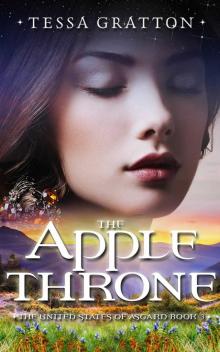 The Apple Throne
The Apple Throne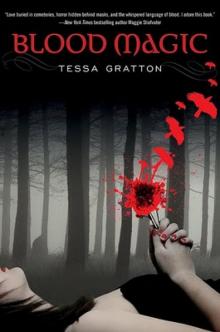 Blood Magic
Blood Magic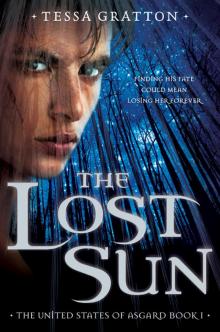 The Lost Sun
The Lost Sun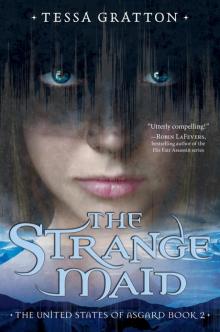 The Strange Maid
The Strange Maid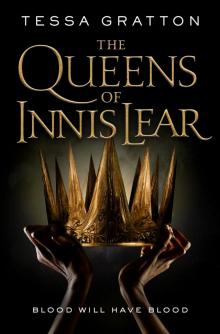 The Queens of Innis Lear
The Queens of Innis Lear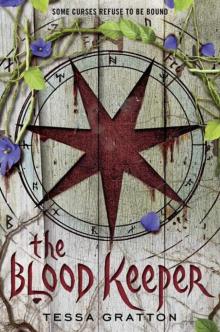 The Blood Keeper
The Blood Keeper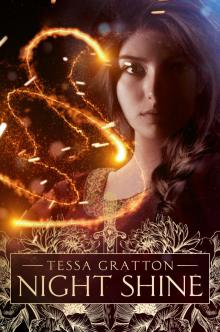 Night Shine
Night Shine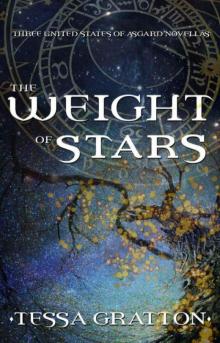 The Weight of Stars
The Weight of Stars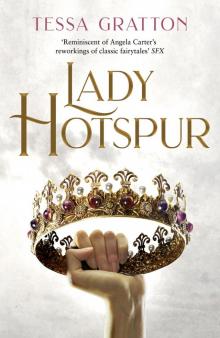 Lady Hotspur
Lady Hotspur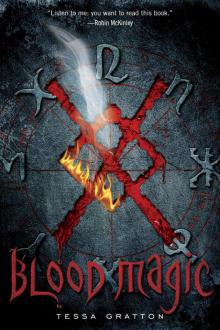 Blood Magic (The Blood Journals)
Blood Magic (The Blood Journals)